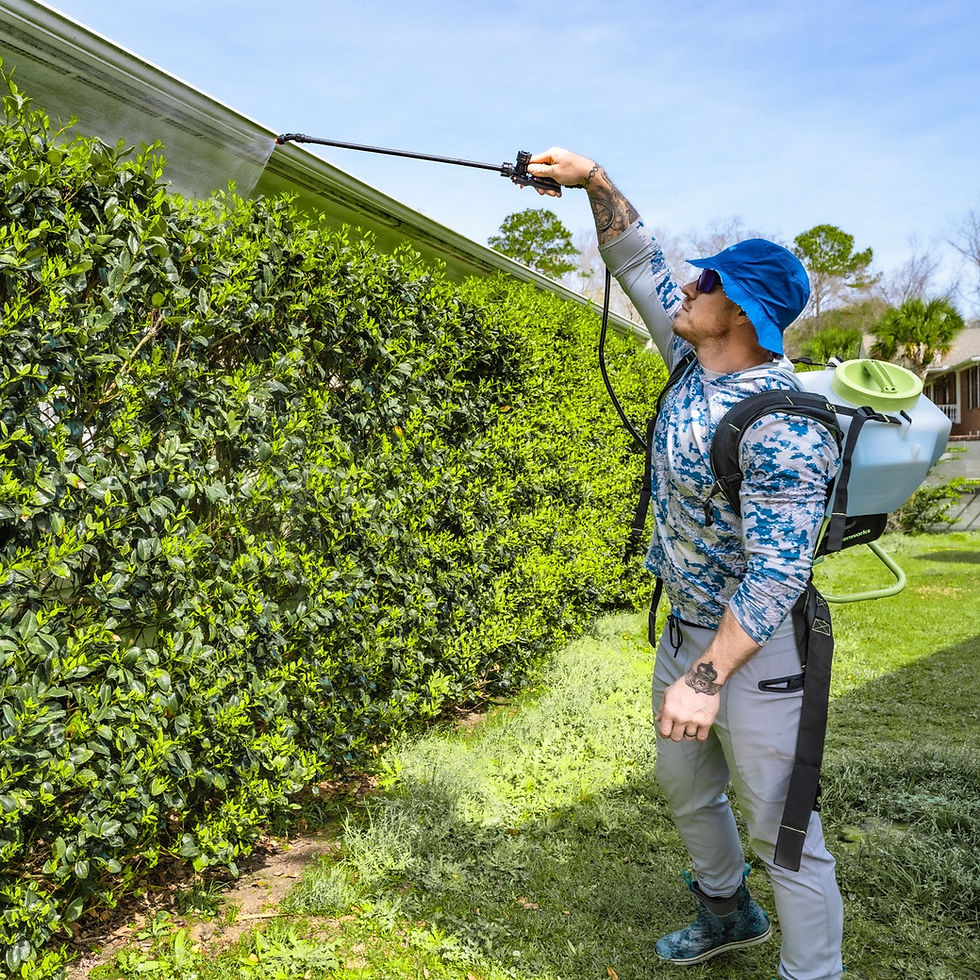Soft Wash vs. Power Wash: Understanding the Differences
- Gina Cordoba
- Mar 20, 2024
- 4 min read
In the realm of home maintenance and exterior cleaning, two prominent methods stand out: soft washing and power washing. Both techniques are employed to cleanse exteriors, driveways, decks, and patios, ridding them of dirt, mold, algae, and other unwelcome substances. However, despite their similar end goals, soft washing and power washing utilize distinct approaches and technologies, each with its advantages and best-use scenarios. This blog will delve into the differences between soft wash and power wash, helping homeowners in Fort Mill, SC, and beyond make informed decisions about which method is best suited for their maintenance needs.
Understanding the Soft Wash vs. Power Wash debate is crucial for homeowners in Fort Mill, SC, looking to choose the right cleaning method that combines effectiveness with surface safety, and EcoShine is here to guide you every step of the way.
What is Power Washing?

Power washing, also known as pressure washing, employs high-pressure water spray to remove loose paint, mold, grime, dust, mud, and dirt from surfaces and objects such as buildings, vehicles, and concrete surfaces. The sheer force of the water makes power washing highly effective for cleaning hard surfaces that can withstand high pressure. It's particularly useful for tackling stubborn stains, like grease spots on driveways or mildew on concrete.
What is Soft Washing?

Soft washing takes a gentler approach. It uses low-pressure water combined with special detergents to clean the surface and kill mold, fungi, bacteria, and other organisms. The cleaning solution soaks into the surface for a certain period before being washed off with a low-pressure stream of water. Soft washing is ideal for surfaces that might be damaged by high pressure, such as roof shingles, wood siding, and screened porches.
The Key Differences
Pressure: The most significant difference lies in the water pressure used by each method. Power washing relies on high pressure to blast away dirt and grime, which can be as high as 3,000 PSI (pounds per square inch). In contrast, soft washing uses much lower pressure, under 500 PSI, relying more on the cleaning agents to do the work.
Cleaning Solutions: Soft washing utilizes special cleaning solutions to break down dirt and organisms on the surface. These solutions are environmentally friendly and designed not to harm plants or animals. Power washing can also use cleaning solutions, but the primary cleaning force is the water pressure.
Application: Soft washing is preferred for surfaces that are easily damaged or have materials that could be degraded by high pressure, such as wood panel siding, asphalt shingles, and older brick that may be crumbling. Power washing is suitable for harder surfaces like concrete, brick (in good condition), and stone pavements.
Advantages and Disadvantages
Power Washing
Advantages:
Highly effective at removing stubborn stains and build-up.
Quick and efficient for large, hard surfaces.
Ideal for preparing surfaces for painting or refinishing.
Disadvantages:
Can damage softer or older surfaces.
May not kill mold or algae spores, allowing them to regrow.
Requires more skill to avoid damage.
Soft Washing
Advantages:
Safe for all types of surfaces, including delicate ones.
Kills mold, algae, and other organisms at the source.
Less risk of damage to property or landscaping.
Disadvantages:
May not be as effective on extremely hard surfaces with stubborn stains.
Cleaning solutions must be carefully chosen to avoid harm to plants or animals.
Which Method to Choose?
The choice between soft washing and power washing depends on the surface to be cleaned and the type of dirt or organisms present. For homeowners in Fort Mill, SC, considering the local climate and the materials used in your home’s construction can guide your decision. For example, the humid climate in South Carolina can encourage the growth of mold and algae, which may be more effectively treated through soft washing.
Understanding the differences between soft wash and power wash is crucial for maintaining the exterior of your home safely and effectively. Each method has its place in home maintenance, and choosing the right one can extend the life of your property's surfaces while keeping them looking their best. Homeowners should assess their needs, consider the surface material, and possibly consult with a professional to make the best choice for their home maintenance projects.
By embracing the appropriate cleaning method, you not only enhance the curb appeal of your home but also contribute to its longevity and value. Whether you opt for the gentle touch of soft washing or the robust cleaning power of power washing, your Fort Mill, SC home will thank you for it.
EcoShine stands at the forefront of exterior cleaning services in Fort Mill, SC, by masterfully offering both soft washing and power washing techniques to meet the diverse needs of homeowners. Recognizing that each home and surface demands a tailored approach, we leverage the gentle, biodegradable solutions of soft washing for delicate areas prone to damage, ensuring the safety and longevity of your property’s materials. Simultaneously, our power washing services tackle the toughest stains on more resilient surfaces, employing high-pressure water jets to restore them to their pristine state. This dual expertise allows EcoShine to provide comprehensive, customizable cleaning plans, ensuring every inch of your property is treated with the utmost care and professionalism, regardless of the challenge at hand. With EcoShine, homeowners in Fort Mill, SC, can enjoy the peace of mind that comes from having a clean, well-maintained home, reflecting the beauty of their surroundings without compromising the integrity of their property.






Comments